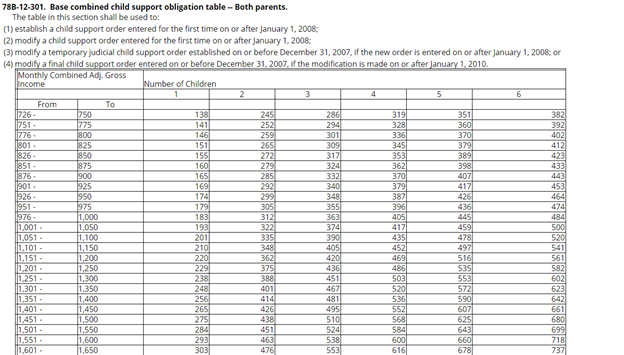
Utah child support laws, according to the Utah Department of Human Services, serve to “promote independence through responsible parenthood and to ensure public funds are used appropriately.”
These laws also aim to reduce the amount used in running public assistance programs. For parents receiving or paying child support, the words above have very little meaning because your concerns include relevant questions like, what do I do if the other parent refuses to pay? what if I lose my job before the child turns 18?
How does the judge decide what amount I am going to pay?
Here is everything parents must know about upkeep in Utah.
How to apply for child support in Utah
As hinted above, the Utah Department of Human Services through the ORS (Office of Recovery Services), is the state agency tasked with providing child support services in Utah under the federal/state IV-D child support program. So, to apply for services, what parents must do is download this application, complete it, then mail it back.
You may also apply online here, or email [email protected]
Because of COVID-19, the ORS recently issued the statement below to discourage in-person applications.

The services provided include non-custodial parent location, paternity order establishment, enforcing Utah child support guidelines, and the review and adjustment of support orders.
What to remember:
- If the non-custodial parent resides in another state or country, the ORS will refer your case to that state or country.
- In Utah, the ORS can only collect past-due support for four years after the last child turns 18.
- The DHS will not represent either parent, it does not give legal advice, nor does it address custody, visitation, or property settlement issues.
- The application form will take thirty to one hour to complete. So, try to be as accurate as you can to avoid repeating.
- The ORS service number is (801)536-8500.
How is paternity established in Utah?
According to the courts, there are three ways to establish paternity in Utah. One is via the Voluntary Declaration Form, where the father signs the form at the hospital after childbirth. The second option is through a court or administrative order, thus the name “involuntary acknowledgment of paternity.”
The third option is when either parent petitions the court to require the other parent to take a DNA test (judicially). And the other option is an administrative establishment where a body such as the ORS conducts a DNA test.
What to remember:
- Establishing paternity in Utah gives the father the same rights he would enjoy if he and his partner never split, thus you gain rights such as visitation or custody.
- Before you sign the Voluntary Declaration form, the ORS advises parents to listen to an oral presentation by calling 1-800-662-8585, then press 2, 6.
- As long as both parents agree to sign, you may sign the Voluntary Declaration of Paternity at any time at the Department of Health, Vital Records, and statistics.
- You have 60 days to rescind your Voluntary Declaration of Paternity.
- If you have doubts over the child’s paternity, do not sign the form until you take a DNA or blood test.
- Parents receiving public assistance qualify for ORS services automatically.
Download the Voluntary Declaration of Paternity form here
How is child support determined in Utah?
Utah child support laws say quote, “each child is entitled to a determination of support without respect to the marital status of the parents at the time of the child’s birth.” Accordingly, the state adopted a version of the Income Shares Model that seeks to provide child support at the same level the child would receive if the parents never split.
That said.
The court will set your financial obligation in proportion to your adjusted gross income unless during periods of court-ordered parenting time as outlined in section 78B-12-216. What do I mean?
Section 216 reduction for extended parenting time (Utah) reads quote:
“The base child support award shall be (a) reduced by 50% for each child for periods during which the child is with the non-custodial parent by order of the court or by written agreement of the parties for at least 25 of any 30 consecutive days of extended parent-time or (b) 25% for each child for periods during which the child is with the non-custodial parent by order of the court, or by written agreement of the parties for at least 12 of any 30 consecutive days of extended parenting time.”
How to calculate child support in Utah
Utah’s child support formula is based on three components, Medicare, base child support, and childcare expenses. In practice, the courts determine parental obligation using a table. What do I mean?
To determine your obligation, first, use the court provided Utah child support calculator here. Then cross-reference the resulting figure with the 78b-12-301. Base combined child support obligation table. (see the snippet below).

Utah base combined child support obligation table.
You may also use the following worksheets to estimate your obligation:
- Joint Physical Custody Worksheet
- Sole Custody Worksheet and Instructions.
- Split Custody Worksheet and Instructions.
Download all related forms here.
What to remember:
- The worksheet or calculator only estimates; thus, it is up to the judge to decide a final support amount.
- Utah courts use the Incomes Shares Model to divide obligation.
Grounds for child support deviation in Utah
Utah child support formula does not always yield fair results. Because of that, the law allows the judge to deviate from the formula/guidelines considering the following factors according to Utah Code Section 76B-12-2-202(3):
- Either parent’s ability to earn.
- The financial needs of the parents and child.
- The age of the child(ren).
- The relative wealth and income of the parents.
- parent or child’s disability.
Note that the court only grants deviations in exceptional circumstances such as when a disability leads to a parent losing his/her ability to earn. Thus, talk to a family court attorney to see if a deviation is your best path.
How to modify child support in Utah
According to Utah child support laws, parents can only petition for support order change if “the difference in the currently ordered child support amount and the proposed child support amount is at least 10%.” On top of that, support order change cannot be temporary or last less than 1 year.
To begin the modification process, you can take one of two paths. One is to file a motion to adjust. Or, two, petition the court to modify.
What to remember:
- although simpler and faster to process, a motion can only be used in limited circumstances. On the other hand, to file a petition, you must download and complete the appropriate form here.
- Modification requirements depend on whether it has been three years since the order was entered.
It is also worth noting that if it has been less than three years since you got your child support order, then there must be a 15% difference between the proposed support amount and the support amount currently ordered. And, you must also demonstrate to the court that a material change in circumstances has occurred.
A material change here refers to factors such as the emancipation of a child, the changing medical needs of the child, a parent’s employment potential, and so on. So, talk to a family court attorney to see if the modification process will work in your favor.
For more information, call the appellate (appeals) Clerk’s Office at 801-578-3900. Or find the closest court in your area here.
What happens if you do not pay child support in Utah.
Utah child support laws recognize the anxiety custodial parents experience due to lack of support. Consequently, congress decided that income/wage withholding should be included in all support orders. That means when you receive a child support order, your employer may also receive an order requiring that child support be garnished from your income, wages, bonuses, and so on (garnished at the source).
However, this enforcement action does not always work, meaning, the ORS may employ any of the following enforcement actions to collect child support.
- License suspension: the ORS through other state agencies may suspend the delinquent parent’s driver’s, professional, or recreational license.
- Passport denial: if you owe more than $2500 in back child support, the ORS may suspend, deny, or revoke your passport.
- Liens on valuable assets such as vehicles, estate property, and other assets.
- Credit bureau reporting: the ORS may also forward your name and financial details to credit bureaus.
- Income tax offset: the ORS may also intercept your state, local, or federal taxes.
Utah attorney general criminal nonsupport amendments 2020
According to the office of the attorney general, failure to pay child support is a form of child abuse, and thus, the crime must be punished in a manner that befits it. That means there are penalties.
To espouse, the new changes are:
- Arrears for a third-degree nonsupport felony went down from $10000 to $5000.
- Aggravated second-degree charges are now applicable to parents who have been previously convicted or pleaded guilty to criminal nonsupport (second offense) or those who owe more than $15000.
Note that a third-degree felony in Utah is punishable by up to five years in prison or a $5000 fine.
How long do you have to pay child support in Utah?
18 is the age of emancipation in Utah. But if the child is still in high school, your obligation will continue until the child’s 19th birthday.
Also, child support may continue indefinitely if a disabled child remains dependent.
It is also possible to make out-of-court college or university tuition agreements. But the agreement must be legal for it to be enforceable. So, talk to your partner or family court attorney.
Utah emancipation
Utah child support laws allow minors above sixteen in the state to petition the juvenile court to declare them emancipated. However, the minor must be:
- Able to handle his/her financial affairs.
- Live independently of his/her parents or guardian.
You may also seek emancipation through military order by joining the US army, marriage, or court order.
More Utah Laws